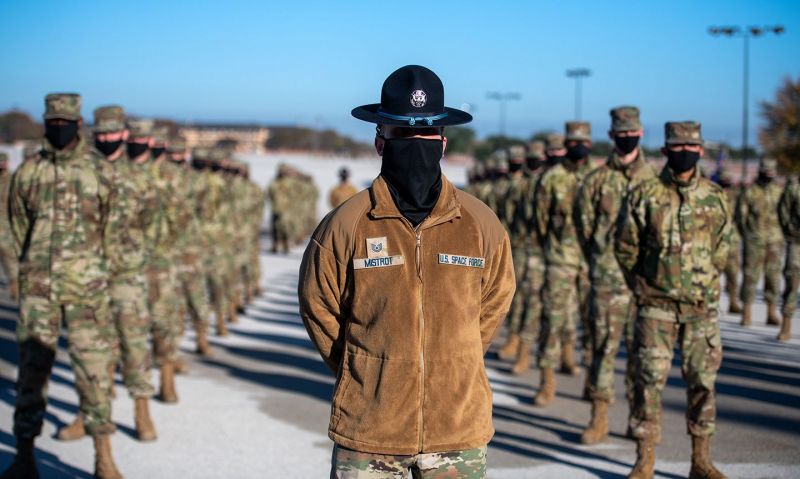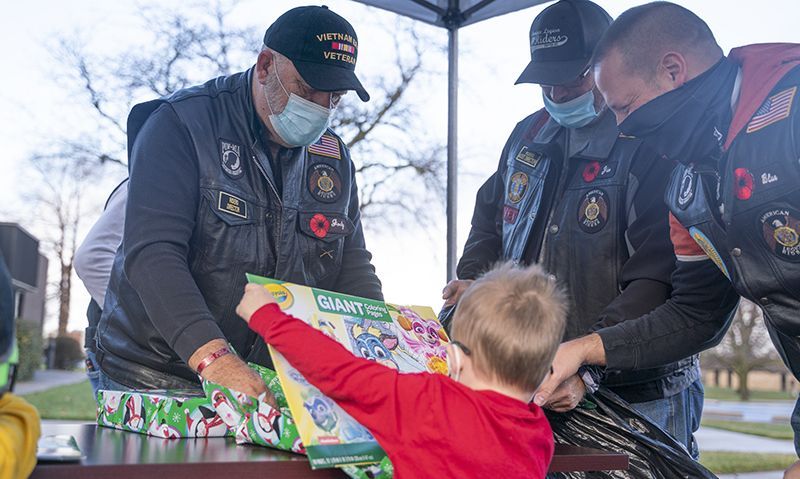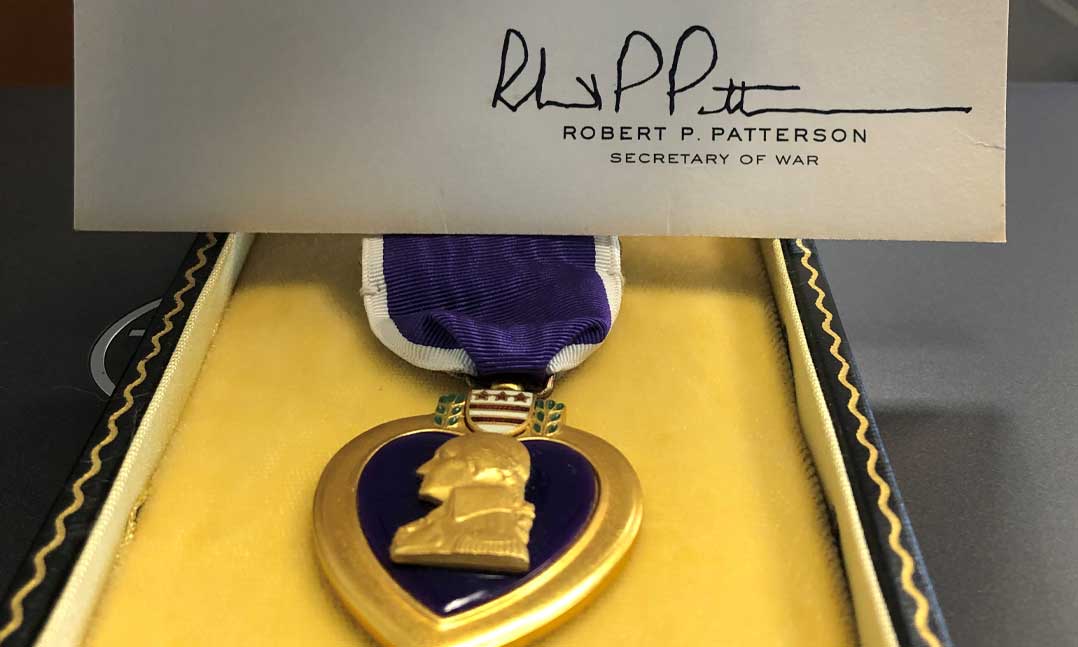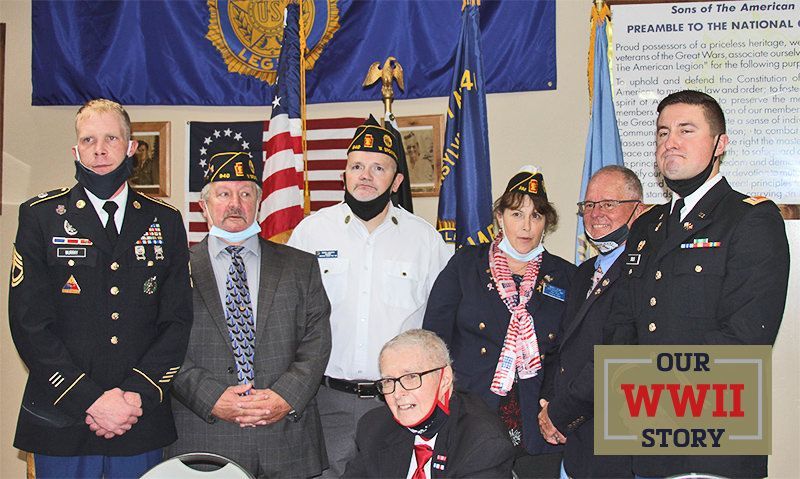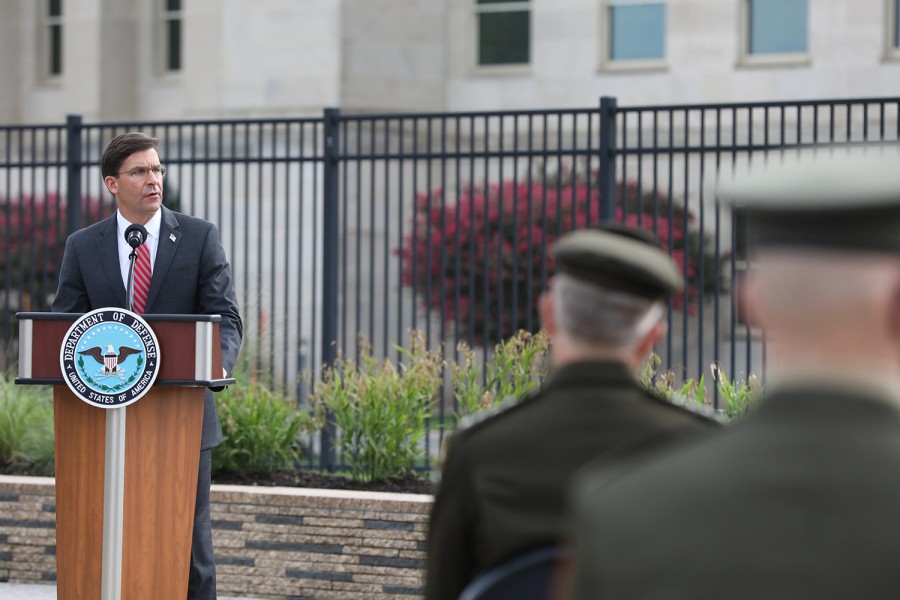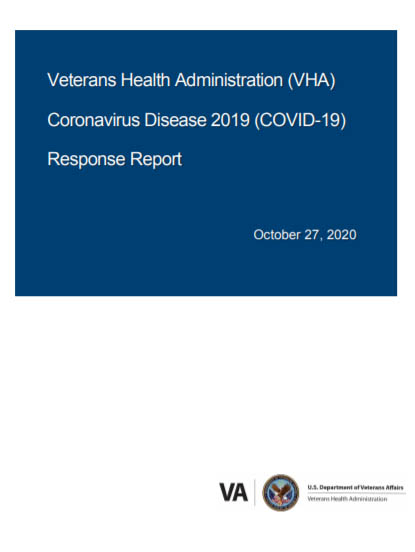News
(American Legion)
On Dec. 20, 2019, the U.S. Space Force – the newest branch of the U.S. Armed Forces – was officially instituted with the signing of legislation by President Donald Trump. On the occasion of the Space Force’s birthday, here are some facts the intervening year may have buried.
1. The Space Force previously existed within the Air Force since 1982, as the Air Force Space Command. (mentalfloss.com)
2. The first official member of the Space Force to be sworn in is its most senior officer: Chief of Space Operations Gen. John W. Raymond. (mentalfloss.com)
3. The branch’s motto is Semper Supra – “always above.” (mentalfloss.com)
4. The initial uniforms are “utilizing current Army/Air Force uniforms, saving costs of designing/producing a new one," according to a Space Force source. "Members will look like their joint counterparts they'll be working with, on the ground." (cnet.com)
5. The Air Force Academy's class of 2020 included 86 graduates set to become the Space Force’s first company-grade officers. (cnet.com)
6. On Sept. 15, 2020, a virtual mass swearing-in was held for about 2,400 troops transferring into the Space Force from locations around the world. (militarybenefits.info)
7. On Dec. 10, 2020, the first seven people to enlist directly in the Space Force graduated from basic training at Joint Base San Antonio-Lackland in Texas. (af.mil)
8. It took no special action for Space Force members to become eligible to join The American Legion, as the organization’s charter only indicates active duty in the U.S. Armed Forces.
9. The Space Force flag was unveiled at the White House in May 2020; by October, Alpharetta American Legion Post 201 in Georgia had obtained one and was flying it above their post home. (legiontown.org)
Photo Credit: U.S. Space Force Tech. Sgt. Eric Mistrot, 324th Training Squadron military training instructor, stands in front of his flight during a graduation ceremony on Dec. 10, 2020, at Joint Base San Antonio-Lackland. Seven members of the graduating class are the first Space Force trainees to graduate. (U.S. Air Force photo by Sarayuth Pinthong)
(American Legion)
By Steven B. Brooks
As the rains stopped and the sun came out on Dec. 11, vehicle after vehicle pulled up to a table and canopy stationed outside of Choices Coordinating Care Solutions on the northeast side of Indianapolis. Out of each vehicle either came children, adults or both – to collect what was an early Christmas, courtesy of American Legion Riders Chapter 341 in Cicero, Ind.
For the second straight year ALR Chapter 341 provided Christmas presents for area foster children. A year ago it was 31 children; this year 33 children found themselves on the receiving end of Chapter 341’s generosity, ranging from ages 2-19.
In the midst of a pandemic in a year full of uncertainty, sacrifice and loss, Choices Foster Care Director Reba James said Chapter 341’s gesture provided both joy and relief.
“I think people are shocked and amazed and so appreciative knowing that all of our kids are totally taken care of for Christmas,” James said. “Especially during COVID, and with all the different families that are in need … it’s been hard to cover everyone. To have this happen for our families so we don’t have to worry about them is just amazing. We are so thankful, and our foster parents are thankful.”
James and her staff solicited individual wish lists from each of the children; Chapter 341 spent $100 per child. In 2019, the children were able to open the presents inside while American Legion Post 341 Legion Family members watched, but COVID-19 moved this year’s effort to a drive-thru outside of Choices’ facility. A table was set up so that the children could open their presents while the Legion Riders – all clad in masks – could see the reactions their effort generated.
“It’s a blast,” Chapter 341 Director Jody Brown said. “When we come here to give the gifts out and see the expressions on the kids’ faces, the smiles, and knowing we’re helping to support the parents by helping them with their foster children, it’s great.”
Past Chapter 341 Director Dave Baughman said a fundraising ride brought in more than $5,000 to fund this year’s gift giveaway and get started on what will be a similar effort in 2021.
“It’s very rewarding,” Baughman said of the effort. “These kids were in situations that I can only imagine. Being able to help those kids and the foster parents is a no-brainer.”
In addition to shopping for all the presents, Chapter 341 Riders get together to wrap all the presents. “We’ll have 25 to 35 of our Legion Riders all in there trying to wrap Christmas presents,” he said. “Most of us don’t know what we’re doing. It’s just a lot of fun.”
James said this year’s donation from Chapter 341 has been especially timely. “We’ve had some really crisis kinds of situations happen with our families,” she said. “Just recently, one of the families that was going to be coming today, the foster father was in an accident and was killed. I was emailing back and forth with the foster mom last night, and she’s not in any position to go get Christmas for the kids. She is so appreciative of this, knowing the kids are going to be getting these gifts and she doesn’t have to worry about that.
“We’ve had foster parents (who contracted COVID-19), we’ve had foster parents who have lost their jobs. This year, more than ever, it’s especially meaningful because of everything everyone’s been through.”
Brown also realized the importance of continuing the effort this year. “Some of these parents may have lost jobs. They’ve lost income,” he said. “We were able to rally some of our folks to raise enough money to help them out."
Chapter 341 was started six years ago and has made a name for itself through its support for various causes, including The American Legion’s Operation Comfort Warriors, a local victim of a school shooting, and the daughter of a disabled veteran in need of a service dog.
Brown, whose tenure of chapter director ends this month, said being a part of Chapter 341 “is amazing. I put this chapter together six years ago … with nine guys. Now we’re up to about 70 members. And not to sound cliché, but we’re so much like a family. It’s just been exciting. And I think we’ve raised in excess of $80,000 in the six years we’ve been chartered. I’m just very proud of our group and what we’re able to accomplish. Our guys have big hearts, and they’re eager to help.”
WASHINGTON – The U.S. Department of Veterans Affairs (VA) today announced a preliminary plan for distributing COVID-19 vaccinations it will implement once the Food and Drug Administration issues an emergency use authorization for a vaccine.
VA has worked in close coordination with the Centers and Disease Control and Prevention (CDC) and Operation Warp Speed to plan for COVID-19 vaccination of VA staff and Veterans.
VA will first provide vaccinations to front-line VA health care workers and Veterans residing in long-term care units in 37 of its medical centers across the country.
The centers, listed below, were chosen for their ability to vaccinate large numbers of people and store the vaccines at extremely cold temperatures.
Health care workers will be among the first to receive vaccinations because they are at high risk for contracting and spreading COVID-19 to other staff members and patients, and their health is critical to ensuring the continued care of Veterans.
Veterans in VA’s long-term care facilities will be the first patient group to be vaccinated. As vaccine supplies increase, additional Veterans will receive vaccinations based on factors such as age, existing health problems and other considerations that increase the risk of severe illness or death from COVID-19.
VA anticipates a limited vaccine supply immediately after FDA’s approval, but expects more supplies to be available in short order.
“VA is well prepared and positioned to begin COVID-19 vaccinations,” said VA Secretary Robert Wilkie. “Our ultimate goal is to offer it to all Veterans and employees who want to be vaccinated.”
The 37 VA sites chosen for initial distribution of the vaccine will closely monitor patients and staff for side effects and log this information in its vaccine monitoring and tracking system. This is the same system VA uses to monitor reactions to all vaccines, including those for the flu and shingles.
VA will report directly to the CDC data on all vaccine doses administered by VA. The department will also provide general, public updates on the number of people who receive the vaccination at these sites, similar to how VA posts COVID-19 testing figures.
The 37 VA sites are spread throughout the country and include:
Birmingham (AL) VA Health Care System
Phoenix (AZ) VA Health Care System
West Los Angeles (CA) VA Health Care System
Palo Alto (CA) VA Health Care System
Eastern Colorado (CO) VA Health Care System
Connecticut (West Haven Campus) VA Health Care System
Washington DC VA Health Care System
Orlando (FL) VA Health Care System
Augusta (GA) VA Health Care System
Edward J. Hines Jr. VA Hospital (IL)
Lexington (KY) VA Health Care System
Southeast Louisiana (New Orleans) VA Health Care System
Maryland (Baltimore) VA Health Care System
Bedford (MA) VA Health Care System
Ann Arbor (MI) VA Health Care System
Minneapolis (MN) VA Health Care System
Harry S Truman Memorial Veterans Hospital (Columbia MO)
St. Louis (MO) VA Health Care System
Omaha (NE) VA Health Care System
Southern Nevada (North Las Vegas) VA Health Care System
Raymond G. Murphy (NM) VA Health Care System
New York Harbor (Brooklyn) VA Health Care System
Western New York (Buffalo) VA Health Care System
Durham (NC) VA Health Care System
Cleveland (OH) VA Health Care System
Oklahoma City (OK) VA Health Care System
Portland (OR) VA Health Care System
Corporal Michael J. Crescenz VA Medical Center (Philadelphia PA)
Pittsburgh (PA) VA Health Care System
Caribbean (Puerto Rico) VA Health Care System
Memphis (TN) VA Health Care System
Dallas (TX) VA Medical Center
Michael E. DeBakey VA Health Care System (Houston TX)
Audie L. Murphy VA Hospital (San Antonio TX)
Richmond (VA) VA Health Care System
Puget Sound (WA) VA Health Care System
Milwaukee (WI) VA Health Care System
Veterans seeking additional information should visit the VA Coronavirus Vaccine FAQs webpage, contact their care team, or visit their facility website.
(VAntage Point)
VA’s Privacy Service and the United States Postal Inspection Service – the law enforcement and crime prevention arm of the Postal Service – recently established a two-year agreement continuing their partnership to provide Veterans and their dependents important information on avoiding scams and protecting their personal information.
This partnership supports the postal inspection service’s national anti-fraud campaign, “Operation Protect Veterans. This initiative alerts Veterans about scams targeting them and their families. It also supports VA’s More Than a Number campaign, an identity protection program that provides information to educate Veterans and their beneficiaries on protecting themselves from identity theft.
Scams targeting Veterans range from the subtle to the audacious and may include:
Benefits buyout offers: Scammers take advantage of Veterans’ needs by offering a quick, upfront buyout of future disability or pension payments at a fraction of the value.
VA phishing scamming: Posing as VA employees, fraudsters call Veterans to “phish” for Social Security numbers and personal financial information, which they use to access bank accounts or open fake credit card accounts.
Bogus employment offers: When posting fake job descriptions to collect personal information from Veterans’ job applications, scammers often also charge an employment fee.
Fake charitable-giving requests: Often using plausible branding techniques, scammers make fraudulent claims about collecting charitable donations that do not actually benefit Veterans or wounded service members.
Fraudulent records promotions: Scammers try to charge Veterans fees to access military records or government forms – information that is available for free through the National Archives (for military records) and VA.gov for local VA offices (for forms).
With their continued partnership, VA Privacy Service and USPIS share a common goal: educating Veterans and their families on simple precautions they can take to protect their identity. Whether it’s mail fraud, bank fraud, or some other type of scheme, both the United States Postal Inspection Service and VA want to help Veterans and their dependents avoid becoming victims.
(VAntage Point) Community leaders across southern New England met virtually to form stronger relationships to prevent Veteran suicides in their region and to discuss outreach strategies for Veterans who are struggling.
Embracing VA’s #BeThere campaign, VA New England Healthcare System recently hosted an online conference called “#BeThere for Service Members, Veterans and Families: Strengthening Our Communities.”
Among the more than 250 attendees were librarians, gun shop owners, educators, social workers, medical professionals, directors of Veteran services and leaders of the faith-based community.
VA speakers reminded the group that you do not have to be a mental health professional to save a life and that suicide prevention is a total team effort.
“We know that VA can’t do this alone,” said Ryan Lilly, VA New England Healthcare System director, in remarks to open the conference. “It’s really going to take every entity, every individual, and every organization that interacts with Veterans on a routine basis to help us get there.”
Suicide prevention important with today’s stress
This year, participants noted that today’s restrictions have added stress to Veterans already feeling the weight of readjustment to civilian life from deployments and economic challenges.
An important part of preventing suicide – particularly during a pandemic – is reaching out.
While the public often focuses on the number of younger Veterans who commit suicide, participants reviewed statistics that show the suicide rate for elderly Veterans is higher than that of non-Veterans of the same age.
Presenters discussed strategies for how communities can connect with Veterans using technology and to find creative ways to reach out and provide support. There are things every person can do every day, like calling a friend or checking in with a neighbor.
Such simple practices are particularly strong preventive factors for suicide during the pandemic because they help people feel less alone, said several speakers.
Fears associated with the coronavirus have intensified PTSD, overall anxiety and depression as well as suicidal thoughts for many Veterans. Many Veterans also feel that they should be able to solve a crisis in their life on their own and therefore are often reluctant to seek help.
Medal of Honor Veteran: We all have a role
“We all have a role in getting people to understand that they don’t have to solve this on their own,” said Ryan Pitts, a former Army soldier from Lowell, Mass., the ninth living recipient of the Medal of Honor from the war in Afghanistan. Pitts said the community can make a difference in reaching out so that Veterans never feel alone.
David W. Schafer, VA New England director of Mental Health, stopped the conference and waited until each participant added the number to the Veterans Crisis Line as a contact on their smartphones.
The number is 1-800-273-8255. Veterans in crisis or those who are concerned can then press 1 to reach help.
Since most Veteran suicides occur among Veterans who have not used VA health care or VA mental health, community partnerships are critically important in reaching Veterans who may not be receiving care from VA. The Veterans Health Administration’s Office of Community Engagement has focused its attention on creating such partnerships.
Building stronger community partnerships
A positive outcome from the conference is building stronger relationships among such partners in New England. Of the 17 Veterans who each day take their own life, 11 have not accessed VA health care.
Another strategy VA New England is using is “postvention,” which builds upon prevention efforts by providing support to those impacted by suicide loss.
Training for VA New England clinicians was scheduled the day before the community conference to discuss resources and support for anyone touched by suicide.
“We’re the touch points for many Veterans who are struggling,” said Schafer. He also noted the importance of each VA clinician using the “strengthening the tool kit” and in finding ways to heal and deal with the personal and professional impacts of suicide loss.
To learn more about VA’s community partnerships to prevent Veteran suicides or to inquire about starting a partnership, visit www.va.gov/healthpartnerships.
The package arrived at the VFW Regional Benefits Office in Phoenix, Ariz., on Aug. 18. It was a bulky package with no return name or address, only a letter explaining what to do with a smaller box inside.
The longhand letter began with — “This was found in my deceased mother-in-law’s estate from her second marriage. Appreciate if you can find relatives of this brave young man and return it to them” — and concluded with a thank you from “Liz.”
Stacey Boren, who received the package that day, read the letter and proceeded to open the smaller box.
Thanks to the efforts of Stacy Boren, the Purple Heart of 1st Lt. John L. Carmody was returned to the family. Boren, who works at the VFW office inside the VA Regional Office in Phoenix, received the Purple Heart along with a request to get it to the rightful heirs. After much research, Boren was put in touch with Carmody’s niece, who now has the medal.
What Boren found inside was a pristine Purple Heart medal engraved with the name of 1st Lt. John L. Carmody, along with a Presidential Memorial Certificate signed by Harry S. Truman on behalf of Carmody.
“When I opened it and saw the presentation case and then the Purple Heart, I got goose-bumps,” said Boren, an administrative assistant at the VFW Regional Benefits Office. “After reading the note that accompanied it, it became our mission to get it back to the rightful owners.”
The medal was addressed to an Edna M. Carmody by the War Department, and it came accompanied with an enclosed note from Robert P. Patterson, the Secretary of War between September 1945 and July 1947.
“The search for 1st Lt. Carmody’s relatives began that very afternoon,” Boren said. “And within a couple of hours, we had found obituaries for 1st Lt. Carmody and his sister, Joan Hirth, on findagrave.com.”
Boren used findagrave.com to message the grave managers, passing along contact information in order to reach surviving family members of 1st Lt. Carmody.
“When I didn’t hear anything towards the end of the day, I started searching for relatives that were listed in Joan Hirth’s obituary,” Boren said. “While discussing my frustration with my boss, Ken Deist, he suggested I call the cemetery where both brother and sister are buried.”
Boren’s search led her to Mount Carmel Catholic Cemetery in Hillside, Ill., where 1st Lt. Carmody and his sister, Joan, were buried. She contacted a representative over the phone and was asked to fax a letter explaining the situation.
“He told me he would forward the contact request to the family,” Boren said. “So again, I waited. For the next 15 days, I constantly checked our voicemail and email for any communication from one of the family members.”
On the early morning hours of Sept. 10, Boren finally received a call from a Marybeth Kelly, who introduced herself as 1st Lt. Carmody’s niece.
“She informed me that she would be thrilled to care for her uncle’s medal. She stated her mother, Joan, would have loved to have had it,” Boren said. “I was just relieved that such a special award was going to a loving home.”
(The American Legion)
World War II Army veteran Frank T. Edwards served his country with valor in the European theater, earning several commendations including the Silver Star.
Edwards earned the Silver Star for his actions on April 4, 1945, near Erlach, Germany. After the war, he returned home and led a productive life as a civilian, including earning his doctorate and becoming a professor at California University in Pennsylvania.
But he only received one of the medals he earned through his valor.
On Veterans Day 2020, that changed thanks to an effort by The American Legion.
“Sgt. Edwards had not been recognized nor received all of his medals,” said Michele Deems, commander of the 25th District in the Department of Pennsylvania. “His good friend, Leonard Siegel, another World War II veteran and Cal professor started inquiring about a ceremony for his 94-year-old friend.”
Siegel contacted West Brownsville (Pa.) American Legion Post 940, which led Commander Terry Sanders to reach out to Deems. She contacted state representatives and eventually Congressman Guy Reschenthaler, a Navy veteran.
That led to Edwards finally receiving the Silver Star, Bronze Star, WW II Victory Medal and another half-dozen medals during a Veterans Day ceremony at American Legion Post 940.
“We can never thank you enough Sgt. Edwards, you are a true inspiration to us all,” Sanders told Edwards, who quietly thanked everyone and rendered a snappy salute.
(VAntage Point)
Planning is underway at VA to deliver a COVID-19 vaccine when one becomes available. VA is working with the Centers for Disease Control and Prevention (CDC) to develop a phased plan based on five core ethical pillars: safety, maximizing the benefit of the vaccine, equity, fairness and transparency.
Veteran and employee safety remain our #1 priority. The plan takes into consideration a number of risk factors, including risks of acquiring infection, severe illness and death if infected, and transmitting the disease, as well as the risk to essential workers, including health care personnel.
VA medical centers across the country performed planning exercises in late October to prepare for initial receipt of the vaccine.
Offering the vaccine first to health care personnel and Veterans
Initially, we expect supplies to be limited. Based on these risk factors, VA will offer the vaccine first to high-risk health care personnel (HCP), as they are essential in continuing to care for patients throughout the pandemic. As more vaccines become available, VA will offer the vaccine to high-risk Veterans. VA’s ultimate goal is to offer it to all Veterans and employees who want to be vaccinated.
Preparing VA facilities
VA medical centers across the country performed planning exercises in late October to prepare for initial receipt of the vaccine. These exercises help sites determine how they will distribute immunizations. They based the decisions on the number of doses available and coordinated communications with Veterans to schedule their immunization.
They also addressed ordering, storage, handling, and administration of the vaccine.
Listening to Veterans
Additionally, VA has been conducting listening sessions and interviews with Veterans across the country to gauge their interest and determine the best methods for reaching out to our diverse Veteran population.
Your local medical facility will update you as vaccines become available.
(Stars and Stripes)
By LOLITA C. BALDOR | Associated Press | Published: November 11, 2020
WASHINGTON — A day after President Donald Trump fired Defense Secretary Mark Esper, three staunch loyalists to the president were named to top defense jobs. Among them was a former Fox News commentator who failed to get through Senate confirmation because of offensive remarks he made, including about Islam.
The abrupt changes sent reverberations through the Pentagon as nervous civilian and military personnel waited for the next shoe to drop. And they fueled worries of a wider effort to drum out anyone considered not loyal enough to Trump.
The unease was palpable inside the building throughout the day over concerns about what the Trump administration may do in the months before President-elect Joe Biden takes office and whether there will be a greater effort to politicize the historically apolitical military. While radical policy shifts seem unlikely before the Jan. 20 inauguration, the changes could further damage prospects for a smooth transition already hampered by Trump's refusal to concede his election loss.
James Anderson, who had been acting undersecretary for policy, resigned Tuesday morning and he was quickly replaced by Anthony Tata, a retired Army one-star general. A short time later, Joseph Kernan, a retired Navy vice admiral, stepped down as undersecretary for intelligence, hastening what had been an already planned post-election departure. Kernan was replaced by Ezra Cohen-Watnick, who becomes acting undersecretary for intelligence.
The departures came on Christopher Miller's second day on the job as defense chief. Miller also brought in his own chief of staff, Kash Patel, to replace Jen Stewart, who had worked in that job for Esper. Patel and Cohen-Watnick are both considered staunchly loyal to Trump and previously worked at the National Security Council.
Patel was among the small group of aides who traveled with Trump extensively during the final stretch of the campaign. He also is a former prosecutor in the national security division of the Department of Justice and former staff member on the House Intelligence Committee. In that post, he was a top aide to Rep. Devin Nunes, R-Calif., leading the investigation into Russian interference in the 2016 election.
Patel was linked in media accounts to efforts to discredit the investigation into ties between the Trump campaign and Russia. He moved to the National Security Council in February 2019, and earlier this year, he traveled to Syria for rare high-level talks aimed at securing the release of two Americans who have been missing for years, including journalist Austin Tice.
Cohen-Watnick was a protégé of Trump’s initial national security adviser, Michael Flynn, but was replaced in the summer of 2017 by Flynn’s successor, H.R. McMaster, as part of a string of shakeups at the White House and National Security Council.
While the personnel changes added to the tumult in the wake of Esper's departure, it's not clear how much impact they could have on the massive Pentagon bureaucracy. The department is anchored by the tenet of civilian control of the military, and much of the day-to-day activities are conducted by career policy experts and military leaders in the U.S. and around the globe who adhere to a strict chain of command.
Also, many of Trump's policies and defense priorities have already been put in motion by Esper and his predecessors, guided by the Joint Chiefs of Staff, including the chairman, Army Gen. Mark Milley. All of those military leaders remain in place.
This is Trump's second attempt to secure the policy job for Tata. Earlier this year, Trump appointed Tata to the post, but the Senate canceled a hearing on the nomination when it became clear that it would be difficult if not impossible to get him confirmed. Tata withdrew his name from consideration for the job, which is the third-highest position in the department. Trump then appointed Tata to serve in the job of deputy undersecretary.
There has been continuing tumult in the Pentagon's policy shop. John Rood was forced to resign as undersecretary for policy in February after he drew White House ire for warning against the U.S. withholding aid to Ukraine, the issue that led to the president’s impeachment.
Tata will be “performing the duties of” the undersecretary job, rather than holding the “acting” title. Officials who carry the “acting” title have more authority than those who are “performing the duties of” the job.
According to reports, Tata posted tweets in 2018 calling Islam the “most oppressive violent religion I know of,” and he called former President Barack Obama a “terrorist leader” and referred to him as Muslim. The tweets were later taken down.
At the time of the Senate hearing, Rep. Adam Smith, D-Wash. and chairman of the House Armed Services Committee, said Trump must not prioritize loyalty over competence and install someone in a job if the “appointee cannot gain the support of the Senate, as is clearly the case with Tata.”
Defense officials said Miller, who previously was director of the National Counterterrorism Center, continues meeting with staff and becoming familiar with the Pentagon and its wide range of complex and critical national security issues and mission.
Anderson's departure was first reported by Politico.
Associated Press writers Eric Tucker, Jill Colvin and Ben Fox contributed to this report.
WASHINGTON — The U.S. Department of Veterans Affairs today announced publication of its Coronavirus Disease 2019 (COVID-19) Response Report detailing its efforts to address the pandemic from early January through June 30.
The report results are a continuation of VA’s pledge to share best practices and lessons learned with other government agencies and the private health care system while the country fights COVID-19.
“As the nation’s largest integrated health care system, VA’s COVID-19 response has been robust and far-reaching. This includes 24 current and 75 completed Fourth Mission assignments involving more than 2,000 VA employees helping to support non-Veteran patients and non-VA health care systems,” said VA Secretary Robert Wilkie. “This report reflects VA’s agility throughout the pandemic to adapt based on lessons learned in order to continue providing safe, quality health care to Veterans as we continue to battle the pandemic.”
The COVID-19 Response Report provides an extensive look at VA’s complex COVID-19 response, including the department’s planning and preparation ahead of the pandemic; the initial crisis response; key COVID-19 policies and directives; interactions and interdependencies with federal and state agencies; and adaptations to health care operations. It provides a forthright view of challenges and issues that VA needed to address in order to effectively respond to the pandemic, such as exchanging supplies, Personal Protective Equipment and deploying health care personnel across the enterprise to meet critical needs in certain areas.
The department implemented a wide range of actions to ensure the safety of its patients and employees while never closing its doors. As of November 6, VA has tested 879,457 Veterans and employees for COVID-19 and diagnosed 67,905 Veterans with COVID-19, 14,168 of whom were admitted to a VA medical center for care. VA has hired more than 59,095 new employees since March 29 in response to the surge in demand for care during the pandemic. In addition, VA moved many appointments to telehealth meetings to keep Veterans and employees safe and has seen a 1,525% increase in home or offsite telehealth visits.
As of June 29, VA participated in more than 90 and led 28 multiple-site COVID-19 research studies. Notably, VA participated in research on 3D-printed respirator masks and convalescent plasma to treat COVID-19 patients, as well as other promising therapeutics, and laid the groundwork for participation in COVID-19 vaccine clinical trials.
The report was compiled through more than 90 interviews with health care leaders and stakeholders as well as a variety of documents and data pertaining to the Veterans Integrated Service Networks and health care enterprise. It cites conclusions, findings and recommendations across several categories, including recognition of the threat and planning; national and interagency coordination; emergency management and readiness; data and analytics; capacity, supply chain and testing; clinical operations; research; and moving forward.
VA expects to develop further reports to document the evolution of VA’s response to the pandemic and consider additional strategic follow-up actions informed by the ongoing experience.
A synopsis of VA’s COVID-19 Response Report and the full report are available on the VA website. VA also released its COVID-19 Response Plan in March and its Charting the Course Plan for how VA facilities would resume services temporarily halted by the crisis in May.
